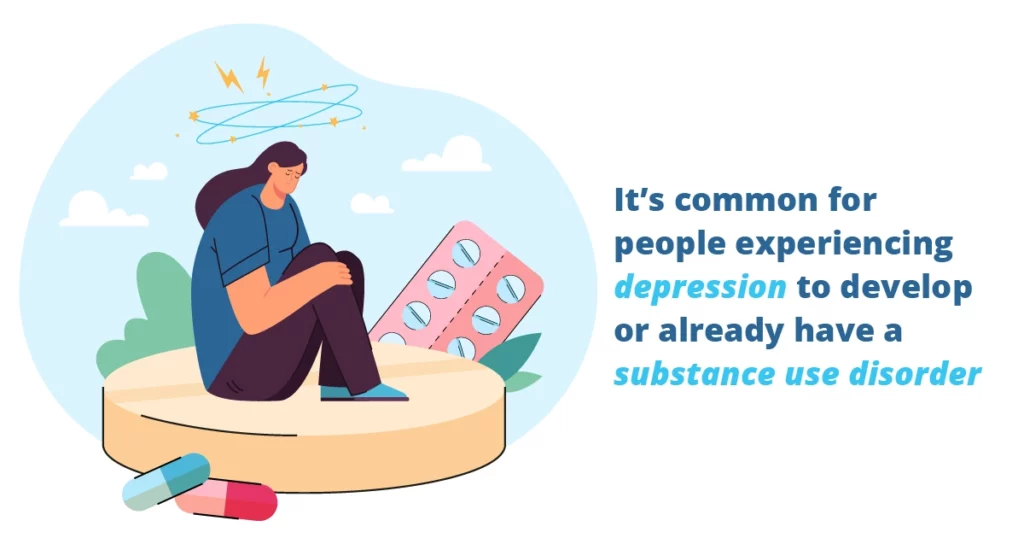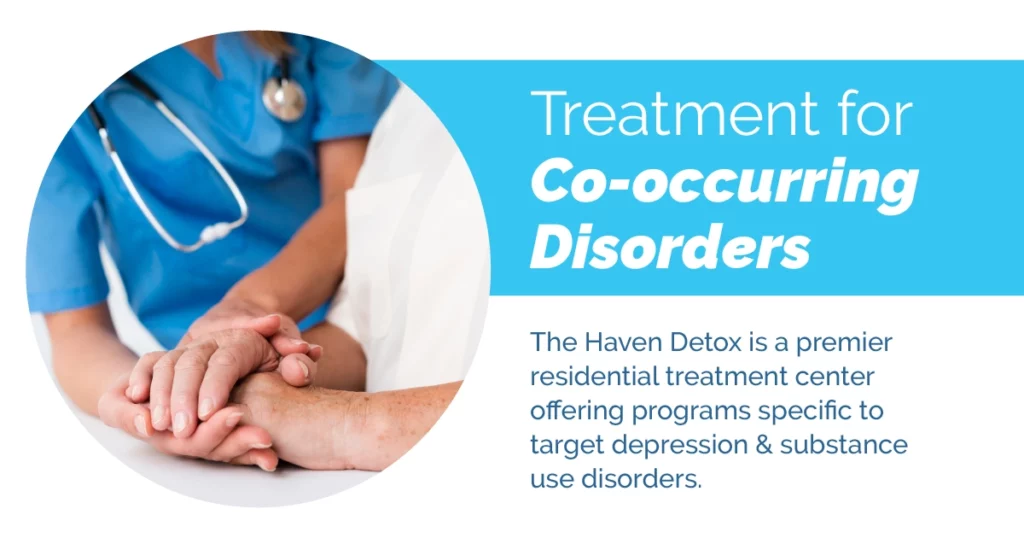Depression and substance use disorder can feed each other. People with depression are more likely to develop a substance use disorder (including alcohol use disorder and drug abuse) to cope with overwhelming feelings. This can quickly turn into a dangerous and chronic cycle as both mental illnesses deepen each other.
For instance, people with a substance use disorder may turn to substances for relief from their depressive disorder, but then struggle to overcome their addiction because of the weight of their depression. If you have a mental health disorder like depression, it’s crucial you find help from a mental health professional before symptoms worsen. The longer you wait to get help and heal, the more substance use may develop and progress into an addiction.

Appearance of Depression and Addiction
Depression is a common mental health disorder that, according to the World Health Organization, affects 3.8% of the world’s population. Those with depression feel more than the average mood fluctuation, interfering with daily life and affecting their ability to work, socialize, and accomplish simple tasks.
Depression is more than a brief response to negative events or setbacks in our lives, it’s a lasting mental illness that can progress over time if not properly diagnosed and treated through psychiatry or therapy. In fact, depression and substance use disorders can create additional health problems from drug use, alcohol use, and other risky coping attempts.
Common Symptoms of Depression
For someone with depression, every day can feel like a challenge. If you are experiencing depression, speak with a mental health professional and seek treatment before your symptoms become severe:
- Episodes of sad, irritable, and overwhelming feelings of emptiness
- Loss of interest or pleasure in activities you used to enjoy
- Sleep interruptions and trouble
- Guilt, low self-worth, and hopelessness
- Poor concentration
- Low energy
- Low mood
- Changes in appetite or weight
- Thoughts of death or suicide
Connection Between Major Depressive Disorder and SUD
It’s common for people experiencing depression to develop or already have a substance use disorder. This is referred to as a co-occurring disorder or a dual diagnosis. According to the National Institute of Mental Health Research, nearly half of those who experience a substance disorder in their lifetime will also have a co-occurring mental disorder, especially mood disorders.
This happens because those with depression attempt to self-medicate with drugs and alcohol, subsiding emotional pain and providing a sense of relief and happiness. Drug use can intensify long-term feelings of hopelessness and loneliness.

Common Signs of a Co-occurring Disorder
Symptoms of depression and substance use disorder are similar and often overlap with each other. As a person who has a co-occurring disorder feels negative feelings associated with depression, they also deal with substance use while coping with overwhelming emotional pain. In looking for “comorbidity,” see if you notice:
- Sudden changes in behavior
- Isolation and failure to communicate
- Experiencing issues in close relationships
- Refusal to acknowledge their problem
- Feelings of anxiety
Treatment for Co-occurring Disorders
The best treatment programs for substance use and mental health disorders focus on both conditions, including medical or physical conditions as well. Mental health professionals in addiction treatment can help manage depression so that patients can return to living life—free of opioids, stimulants, alcohol, or other self-medicating attempts.
Some methods include antidepressants, proper diagnosis with the DSM (Diagnostic and Statistical Manual of Mental Disorders), and emerging therapies like TMS. Others rely on support groups, medical detox to control withdrawal symptoms, and even exercise to boost serotonin.
Some may find resources like medical support, counseling, and peer support helpful while others use intensive inpatient and outpatient programs to maximize treatment outcomes after intense dependence, abuse, and cravings.
Get Help with The Haven Detox
The Haven Detox is a premier residential treatment center offering dual diagnosis programs to target depression and substance use disorders. Clients with depression can successfully manage a new life without problematic substance use through detox, residential treatment, and aftercare. Contact us at (561) 328-8627 when you feel ready to take the next step.






